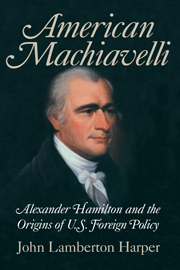Book contents
- Frontmatter
- Contents
- List of Illustrations
- Acknowledgments
- Miscellaneous Frontmatter
- Introduction
- PART I THE COMING OF NECESSITY
- PART II BATTLE LINES ARE DRAWN
- PART III SEIZING THE HELM
- 8 The Birth of American Neutrality, February–May 1793
- 9 “A Most Distressing Dilemma,” May–December 1793
- 10 Hamilton and the Crisis of 1794
- 11 The Jay Treaty
- PART IV INFORMAL ADVISER TO THE PRINCE
- PART V A PRINCE IN HIS OWN RIGHT?
- PART VI THE LESSER OF EVILS
- Conclusion: Hamilton Then and Now
- Notes
- Bibliography
- Index
11 - The Jay Treaty
Published online by Cambridge University Press: 05 April 2013
- Frontmatter
- Contents
- List of Illustrations
- Acknowledgments
- Miscellaneous Frontmatter
- Introduction
- PART I THE COMING OF NECESSITY
- PART II BATTLE LINES ARE DRAWN
- PART III SEIZING THE HELM
- 8 The Birth of American Neutrality, February–May 1793
- 9 “A Most Distressing Dilemma,” May–December 1793
- 10 Hamilton and the Crisis of 1794
- 11 The Jay Treaty
- PART IV INFORMAL ADVISER TO THE PRINCE
- PART V A PRINCE IN HIS OWN RIGHT?
- PART VI THE LESSER OF EVILS
- Conclusion: Hamilton Then and Now
- Notes
- Bibliography
- Index
Summary
Education of an Envoy
John Jay has been called “the lost founding father,” someone who, although a member of the inner circle, did not quite make it into the pantheon of heroes. One reason may be his personality. Many found him cold, aloof, and vain in a prudish sort of way. His portrait by Joseph Wright shows him stiff-necked and sporting a slightly supercilious frown, though with a thoughtful, sensitive pair of eyes. He was a stickler on matters concerning his own, and his country’s, dignity, though for a select few he had his droller side. As president of the Continental Congress, he wrote Washington of his unruly charges, “there is as much intrigue in this state House as in the Vatican, but as little secrecy as in a boarding school.” There were striking affinities between Jay (born in 1745) and Hamilton. Jay was of Huguenot stock, scion of a family of La Rochelle merchants who had been forced to leave France for England and America after the revocation of the Edict of Nantes in 1685. Like Hamilton, he studied at King’s College (where he was suspended for refusing to tattle on fellow students who had smashed a table), became a successful lawyer, and made a politically consequential marriage, in his case to Sarah “Sally” Livingston, daughter of the New Jersey Whig leader William Livingston.
As a delegate to the Second Continental Congress in June 1775, Jay penned a draft of the so-called Olive Branch Petition to the king, including the passage (later deleted) “That altho the People of North America are determined to be free they do not wish to be independent and beg leave again to assure his Majesty that they mean not to question the Right of the British Parliament to regulate the Commercial Concerns of the Empire. . . .” Elected to the New York Provincial Congress, he was not in Philadelphia for the crucial vote on July 2, 1776. After the Declaration of Independence, he threw himself into the war effort, but old attachments died hard. When news arrived of the French alliance, Jay wrote Gouverneur Morris: “If Britain would acknowledge our Independence and enter into a liberal Alliance with us, I should prefer a Connection with her, to a League with any Power on Earth. . . . The Destruction of old England would hurt me. I wish it well: it afforded my Ancestors an Assylum from Persecution.”
- Type
- Chapter
- Information
- American MachiavelliAlexander Hamilton and the Origins of U.S. Foreign Policy, pp. 140 - 150Publisher: Cambridge University PressPrint publication year: 2004



